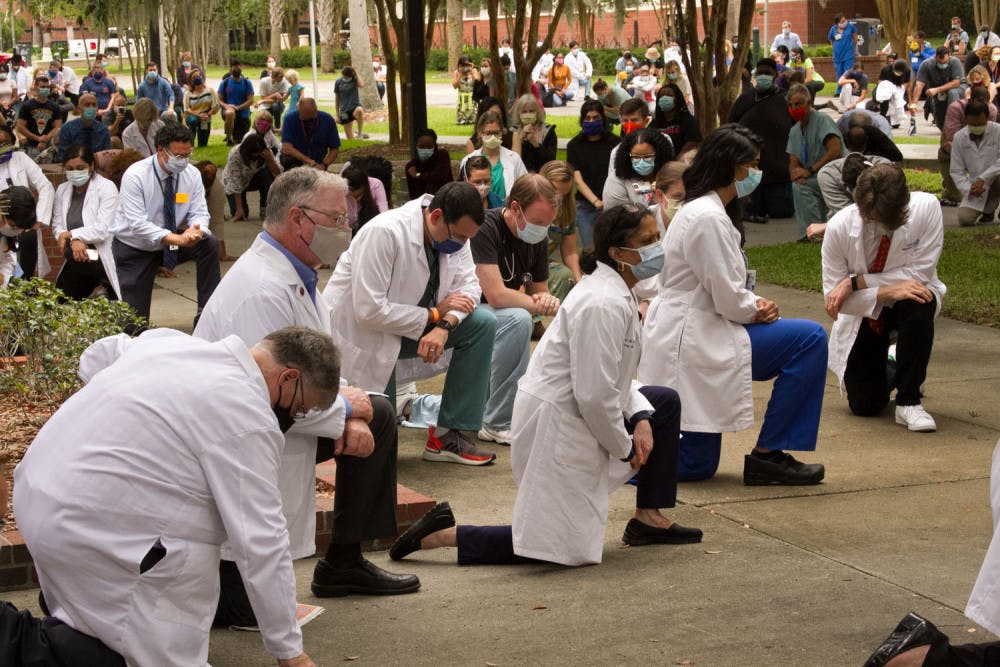
More than one hundred UF Health faculty, staff and students gathered in front of the College of Nursing in remembrance of George Floyd on June 5. “I was honored to be among so many people that attended today’s fight for black lives and I’m honored to be apart of this crowd,” said Dr. Runi Foster, 57, a pulmonologist at the University and the VA Medical Center.
A crowd of more than 100 healthcare workers knelt on the pavement in remembrance of George Floyd. For 10 minutes, only the sound of nearby cars and soft weeping settled over the courtyard. A light sprinkle fell.
Michelle McCraw, 24, and Brittny Randolph, 30, took a knee beside one another outside of the UF College of Nursing. Together, they held a cardboard sign bearing the hashtag “#WhiteCoatsForBlackLives,” a grassroots movement began six years ago by black medical students to expose structural racism in medicine.
The crowd wore masks to prevent the spread of COVID-19, and no patient care was interrupted, said Adrian Tyndall, the interim dean for the College of Medicine.
Medical personnel at Johns Hopkins Hospital, Boston Medical Center, Emory University Hospital Midtown and more all demonstrated at the same time across the country. At 1 p.m. Eastern Standard Time, they knelt.
McCraw and Randolph, friends and fourth-year UF medical students, held their outermost fists in the air. As the minutes crept by, their arms began to tire. They shook out their muscles, and switched arms when it got too painful.
Ten minutes is a long time.

Brittny Randolph, 30, (left), and Michelle McCraw, 24, (right) are both 4th-year medical students at UF. They knelt in silence with fists in the air and encouraged others in the healthcare community to share #WhiteCoatsforBlackLives.
Almost unconsciously, McCraw said, the two leaned their fists together. Together, they reflected, cried and literally supported each other until the 10 minutes were up. Afterward, they grabbed one another in an embrace.
“I think in that moment our fists touched, I also felt like it was very profound,” Randolph said through tears. “I felt we, as black people– we cannot do this on our own. And the burden and responsibility to bring about change cannot, we cannot, it cannot just be ours to bear.”
Black people have been disproportionately impacted by COVID-19 and have historically received unequal medical treatment. As a future physician, Randolph said she feels an even greater sense of responsibility to understand patients’ experiences with oppression and how that can take a toll on their health.
“We have to do a better job at educating the doctors that we’re producing on health disparities, racial inequity and creating culturally competent physicians,” she said.
Solving those problems won’t happen tomorrow, Tyndall said. He said eliminating those inequities is going to require understanding the underlying social fabric that contributes to them.
He said he was incredibly touched by how many people showed up to kneel. The event had been organized only the night before.
“I think the kneeling part, while we may not have necessarily understood the significance of it, is a very long time to snuff out a life,” Tyndall said. “What was captured in such excruciating detail on a camera is what I looked at as a disregard for human life.”
Alex Wood is a resident at UF Health Shands Hospital who just finished his first year of training in internal medicine. While he loves his colleagues, he said he doesn’t think they are representative of the patients they serve.
“We are at Shands Hospital, formerly known as Alachua County General, and the safety net hospital for our county, which has a massive African American population, a massive black population,” he said. “But if you look at the doctors that serve them, we don’t look a thing alike.”
Structural racism has largely prevented black students from occupying healthcare positions at the same rate as white students, Wood said.
“Medicine is full of a ton of very smart, very well-intentioned, very driven individuals that work their ass off every day to help people,” he said. “But they like to pretend that their work is apolitical, because that’s easy, that’s comfortable. There’s already so much on our plate.”
For Randolph, these last few weeks have been traumatizing. She said that every time she scrolls through apps on her phone, she sees people that look like her and those she loves brutalized. These are things that black people are constantly exposed to, she said.
Still, she chooses to remain hopeful. She knows that good exists, and said she has found an ally in McCraw.
“There aren’t really any words to fully encompass the importance or the seriousness of people’s lives,” McCraw said. “But the reason I’m here today is because I know that my black friends matter, my black patients matter, my black colleagues matter, my black brothers and sisters in Christ matter, and that’s not something I take lightly.”
Laura San Juan contributed to this report.
Contact Kaelyn at kcassidy@alligator.org. Follow her on Twitter @kaelyn_cassidy.
Correction: This article has been updated to attribute the final quote to Michelle McCraw and to clarify that #WhiteCoatsForBlackLives began six years ago.





